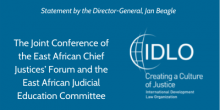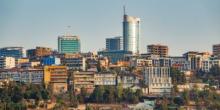Uganda - Cleaning Services RFQ N_965-UGA_21
CONTRACT FOR PROCUREMENT OF CLEANING SERVICES IN UGANDA

Uganda has made much progress in reducing poverty and promoting stability in past years, particularly through improvements on several justice-related indicators. Despite these gains, the justice sector still faces significant challenges relating to funding and capacity, public perceptions of pervasive corruption, inaccessibility of services for the poor sections of the population, low quality and sustainability of the legal aid and information services, costliness and slow speeds of dispute resolution, among others. These challenges have negatively affected citizens’ confidence in the formal system leading people to resort to other means to seek recourse and may also increase the likelihood of violence and further corruption. There is a therefore a need for effective interventions to enhance the reach, quality and sustainability of access to justice in Uganda.
CONTRACT FOR PROCUREMENT OF CLEANING SERVICES IN UGANDA
This sub-project aimed to enhance access to justice for poor, vulnerable and marginalized people in Uganda by strengthening legal aid service delivery. In close cooperation with IDLO, the Legal Aid Service Providers Network (LASPNET) strengthened the capacity of Legal Aid Service Providers (LASPs) to deliver quality services by equipping them with standardized legal aid resource materials and knowledge on project management.
This sub-project aimed to strengthen human rights-based advocacy initiatives to support regulatory and fiscal measures that promote healthy diets by adopting a two-pronged approach based on (i) multi-sectoral and multi-stakeholder advocacy platforms; and (ii) legal empowerment through awareness-raising and capacity development. The Center for Food and Adequate Living Rights (CEFROHT) contributed to healthy diet reforms through the establishment of an Advocacy Working Group (AWG) consisting of representatives from the Government, civil society organizations (CSOs), academia and the media.
This sub-project aimed to enhance access to justice for rural, vulnerable, and marginalized communities of Kakumiro, Kyegegwa, Kikuube and Kagadi districts in mid-western Uganda by strengthening informal justice mechanisms and increasing community participation in the delivery of justice services.
This sub-project aimed to improve access to land justice for the poor and vulnerable population in Uganda by developing increased cooperation between informal and formal land governance, as well as increased community responsiveness towards land rights.
This sub-project aimed to scale up a new model of gender-sensitive sentencing and effective delivery of gender-sensitive community service orders in Western Uganda. Working closely with the Judiciary and the Uganda Prisons Service, Penal Reform International (PRI) strengthened the capacity of criminal justice actors on the management of women offenders and improving representation and support for women offenders in Uganda.
Statement by the Director-General, Jan Beagle at the Joint Conference of the East African Chief Justices’ Forum and the East African Judicial Education Committee
Honourable Chief Justices,
Members of the East African Judiciaries,
Distinguished Guests,

EVENT | 10-12 May | Kigali, Rwanda

This sub-project sought to contribute to sustainable access to justice by working with – and strengthening the capacity of – rural vulnerable communities and justice actors to seek and claim adequate living rights using the 2019 Human Rights (Enforcement) Act (HREA) in the three (3) districts of Buyende, Kiboga and Kyaknwanzi in Uganda. The Center for Food and Adequate Living Rights (CEFROHT) established three (3) Community Advocacy Groups (CAGs) to support vulnerable persons to claim adequate living rights and obligations.
This sub-project aimed to enhance access to justice among adolescent girls and young women by strengthening response mechanisms, linkages and collaboration between formal and informal justice systems in the targeted districts of Tororo, Butaleja, and Busia in Uganda. The Sexual and Reproductive Health (SRHR) Alliance identified and trained Community Response Agents to effectively respond to sexual and gender-based violence (SGBV) cases.




|
Policy Statements
|